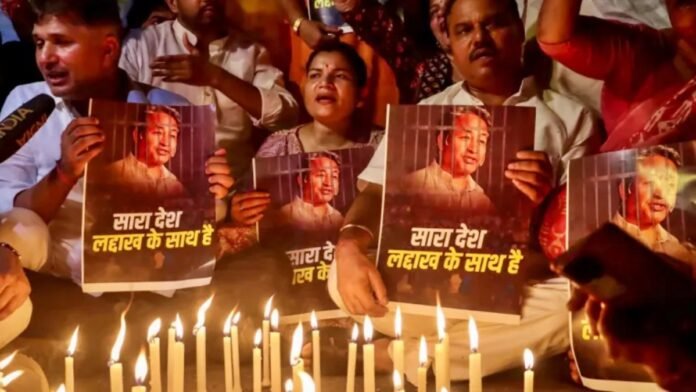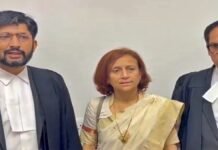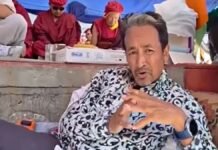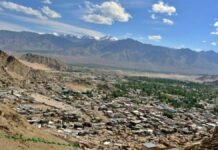
Key Points
- Sonam Wangchuk arrested under the National Security Act on September 26, 2025, and immediately flown to Jodhpur Central Jail under high security
- Four people killed and over 90 injured in violent protests in Leh on September 24, with police using live ammunition claiming self-defense
- FCRA license cancelled for Wangchuk’s organization SECMOL by the Home Ministry over alleged financial irregularities
- Mobile internet suspended in Leh district and curfew imposed as tensions escalate across Ladakh
- Political condemnation from opposition leaders including Omar Abdullah, Arvind Kejriwal, and Jairam Ramesh over the arrest
New Delhi: Climate activist and educator Sonam Wangchuk was arrested under the stringent National Security Act (NSA) from his village Uleytokpo in Ladakh on Friday afternoon and immediately transferred to Jodhpur Central Jail in Rajasthan. The 59-year-old Magsaysay Award winner, who has been leading the movement for Ladakh’s statehood and constitutional protections, was detained by a police team led by Ladakh Police Chief SD Singh Jamwal at 2:30 PM.
Wangchuk has been placed in a high-security ward at Jodhpur Central Jail, where he is under 24-hour CCTV surveillance and round-the-clock security monitoring. The NSA allows authorities to detain individuals for up to 12 months without producing them in court, making it one of India’s most stringent preventive detention laws.
Government Crackdown Following Violent Protests
The arrest comes two days after Ladakh witnessed its worst violence in decades when protests demanding statehood and Sixth Schedule protections turned deadly on September 24, 2025. Four people were killed and over 90 others injured when demonstrators set fire to the regional BJP office and police vehicles in Leh, prompting security forces to open fire.
The Union Home Ministry has directly blamed Wangchuk for inciting the violence through “provocative statements,” though the activist had ended his 14-day hunger strike on September 24 when the violence erupted. In a parallel action, the government cancelled the Foreign Contribution Regulation Act (FCRA) license of Wangchuk’s organization, the Students Educational and Cultural Movement of Ladakh (SECMOL), citing alleged financial irregularities and foreign funding violations.
Family Alleges Police High-Handedness
Wangchuk’s wife, Gitanjali Angmo, has accused authorities of treating her husband “like a criminal without any reason” and alleged that police ransacked their home during the arrest. She told media that over 100 police officers accompanied the arrest team, and authorities refused to provide an FIR copy or detention order details.
“It is the worst form of democracy… without any trial, without any reason, they have just taken him like a criminal,” Angmo stated, adding that the government is spreading “false narratives” to tarnish Wangchuk’s reputation.
Political Firestorm and Opposition Condemnation
The arrest has triggered widespread political condemnation across party lines. Jammu and Kashmir Chief Minister Omar Abdullah called the detention “unfortunate,” while Delhi Chief Minister Arvind Kejriwal termed it “the height of dictatorship”. Congress leader Jairam Ramesh described it as an attempt to divert attention from government failures.
The Aam Aadmi Party organized a candlelight vigil at Jantar Mantar in New Delhi to protest the arrest, with party leaders calling Wangchuk “the hope of India’s youth”. AAP’s Saurabh Bharadwaj criticized the government, stating, “The real traitors are not Sonam Wangchuk but the people sitting in the government who are playing games with the country’s borders”.
Security Lockdown in Ladakh
Following the arrest, authorities have imposed severe restrictions across Ladakh. Mobile internet services have been suspended in the Leh district as a precautionary measure, while curfews remain in effect in several areas. The administration has prohibited gatherings of five or more people, effectively putting the region under a security lockdown.
Core Demands Behind the Movement
The protests stem from long-standing demands for Ladakh’s full statehood, inclusion under the Sixth Schedule of the Constitution for constitutional protections, establishment of a separate Public Service Commission, and allocation of two Lok Sabha seats. These demands have gained momentum since 2019, when the central government revoked Ladakh’s autonomy by separating it from Jammu and Kashmir and placing it under direct federal control.
Negotiations between Ladakhi representatives and the central government have been ongoing since last year, with the next scheduled meeting set for October 6, 2025. However, the recent violence and Wangchuk’s arrest have significantly escalated tensions, potentially complicating future dialogue efforts.




















































